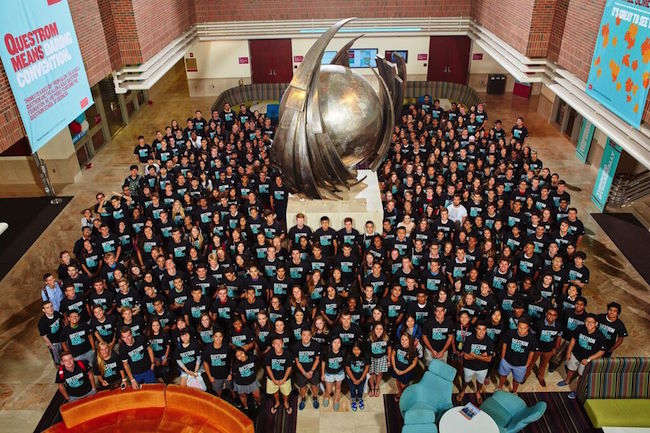What are some of the unique and noteworthy features of the undergraduate curriculum at Questrom?
Broadly speaking, we have a wide variety of more traditional and appropriate business courses built into the required curriculum. Students in the Questrom School begin studying business side by side with liberal arts and non-management students from their very first day here. We have a very integrated learning experience. Students are learning about business from day one, but learning about it in the context of history, philosophy, culture and all the other things that are important as part of a top-tier undergraduate education.
Students take a business society and ethics course their first year, and it is important to note that this is indeed the very first course students take so it really sets the foundation of what the program is and what is valued in the undergraduate curriculum. It contextualizes what business is and its larger role in society and presents a framework for ethical decision making and thinking.
One of the unique things in our curriculum happens in the first semester of junior year. It’s a part of our curriculum known as the cross-functional core. There are four classes students must take, plus a one-credit business plan, and all these classes are integrated together. The students are registered with the same cohort of students in each of the four classes and on smaller student teams that cross across all those courses. The classes include one in finance, marketing, operations and a management course in business analytics, one of the new innovations in our curriculum. Students take a deep dive into those areas of study, but also develop a product idea including a prototype. They have to develop that idea, pitch it and go through a process of getting it approved. The culmination of all this is a full business plan they write as a team, with multiple presentations throughout the course of the semester. This type of entrepreneurial activity requires intense group work and it integrates all their knowledge in a very hands-on and practical way. It is really cool and an amazing experience.
Following this experience, students take on more specific required courses in global strategy and policy, a business capstone course. It looks at the application of business strategy and students need to rely on all the knowledge they gained in the last three years leading up to it.
In the past year, we’ve launched three new concentrations in strategy and innovation, health and life sciences and a real estate concentration. These are in additional to the more traditional areas students can concentrate in like finance, entrepreneurship and marketing. The three new concentrations are what are deemed as cross-functional concentrations, ones that take a newer angle on the study of business. They’re made up of courses not just at the school of business, but through the college of arts and sciences and the Sargent School of Health, as well. We launched them this fall, and we’ve had a surprisingly large number of students who’ve jumped on board to do them, including our seniors.
What advantages do students having being in the heart of Boston, in the hub of a thriving business and college market?
We have a very strong value proposition here at Boston University. The breadth of opportunities for a Questrom student is par none, it is immeasurable. Between the options for academic and community engagement at school and across the university, there is the opportunity to study anything under the sun. There is a dual degree program where student who have a certain GPA can apply and do coursework that allows them to graduate with two different majors and two different bachelor’s degrees. We have in the neighborhood of 100 students a year who graduate with a degree from Questrom and another school at BU. That’s a tremendous opportunity that is available uniquely here.
We’re located in a big college market, but being right here in the heart of the city presents social and professional opportunities that students have during their academic year. They can intern at any variety of companies and organizations, and being right here in Boston enables us to have guest speakers all the time from those places. There are a huge amount of alums who stay in Boston, and they have ongoing engagements with the school and students. That’s a big part of the value proposition.












Questions about this article? Email us or leave a comment below.